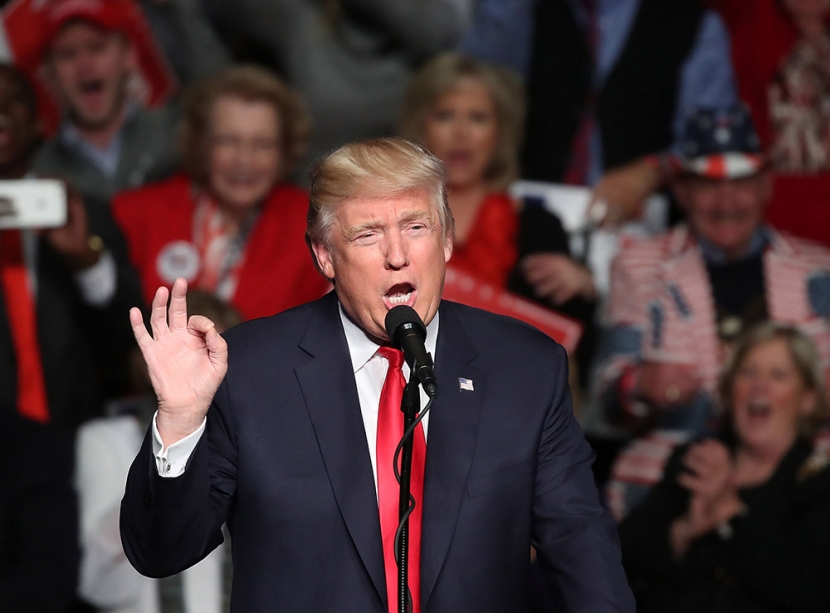From Esquire Magazine (Middle East)

Last November we asked the hypothetical question of “What a potential Trump presidency might mean for the Middle East?” And now, from last Friday we will find out. We spoke to three political commentators and asked them to grapple with a few opening questions of what all this means for our region.
***
The commentators:
Arsalan Iftikhar – an American human rights lawyer, senior editor at The Islamic Monthly, founder of TheMuslimGuy.com and author of ‘Scapegoats: How Islamophobia Helps Our Enemies & Threatens Our Freedoms‘
Juan Cole – the Richard P. Mitchell Collegiate Professor of History at the University of Michigan and the proprietor of the Informed Comment blog.
James Zogby – the founder and president of the Arab American Institute, a Washington, D.C.–based organization which serves as a political and policy research arm of the Arab-American community.
***
ESQUIRE: What are the implications for the Middle East of Donald Trump’s victory?
Arsalan Iftikhar: American foreign policy in the region will be even more schizophrenic than it is today. At least with President Obama we had a rational actor who had a foreign-policy vision, whether you agreed with it or not. With Donald Trump, we now have an irrational actor who can play a wildcard role in virtually any Middle East country without any warning whatsoever.
Juan Cole: Trump has evinced three instincts with regards to his policies toward the Middle East. One is to stay out of it and avoid entanglements and adventures. The second is to support strongmen, including Egypt’s Abdelfattah al-Sisi and Syria’s Bashar al-Assad, as guarantors of stability. The third is to intervene directly with US troops against threats that arise in the region, such as ISIS. It is unclear whether his isolationist side or hawkish side will win out.
James Zogby: I don’t think anyone knows what Trump will do, because I’m not sure he knows what he will do. He has only provided vague slogans, and that’s not enough. For example, he says he wants to cooperate with Russia to defeat ISIS and end the conflict in Syria. That sounds simple enough, but what if Russia’s interests aren’t the same as ours? Or Iran doesn’t go along with it because their interests aren’t the same as Russia’s? Or Turkey and Saudi Arabia don’t agree to go along with this US/Russia effort? Or the opposition won’t stop fighting as long as Assad remains in power? There are two things we do know that cause real concern: while he appears to be non-ideological, I am deeply worried about the hardline ideological appointments he has made to sensitive national security. He is impulsive and can behave recklessly. These appointments will not serve to restrain these tendencies he has shown. Second, his inflammatory rhetoric against Muslims has unleashed hate here in the US and this has been seen overseas. Arabs and Muslims see that we have elected someone who has made bigoted statements during the campaign and has appointed Islamophobes to his team. This will have consequences.
ESQ: To set come context, what are the main changes we’ve seen in terms of Middle East policy with Barack Obama’s presidency?
AI: Unlike with the presidency of George W. Bush, Barack Obama took a less interventionist stance, outside of Libya. The downside to a non-interventionist worldview is that when you have a humanitarian crisis like in Syria, it makes it look to the rest of the world that you do not care about the suffering of millions of innocent people who are being slaughtered.
JC:President Obama’s signature achievement was the Iran nuclear deal, which also entailed the lifting of sanctions and the opening of Iran for diplomacy and commerce. He also tried to manage the fallout of the Arab Spring, giving Egypt’s Hosni Mubarak a push and intervening directly against Muammar Gaddafi in Libya, as well as supporting the Free Syrian Army even after it went Salafi jihadi. He deeply angered the Sunni Arab Gulf oil monarchies with both policies. He also tried to push diplomacy on the Israel-Palestine front and between Afghanistan and Pakistan, but signally failed in both instances, in part because he would not put any of his own prestige behind these talks. On the whole, Obama had relatively little impact on the region, except in Libya where he declined to follow through. Arguably, he may have avoided a war that had been building with Iran.
JZ: He correctly read that after two failed and costly wars the American people were wary of any new conflicts. In addition, the Pentagon is war weary. With 22 veteran suicides each day, they are not ready to commit large numbers of troops in conflicts we can’t win. In response, Obama pulled back and looked for less costly ways to confront terror. He made excessive use of weaponised drones. And he has alienated many of our Arab allies by what they have felt was his dismissive manner toward their concerns. Some say that Bush was ‘too much’ while Obama was ‘too little’. We need ‘just right’.







